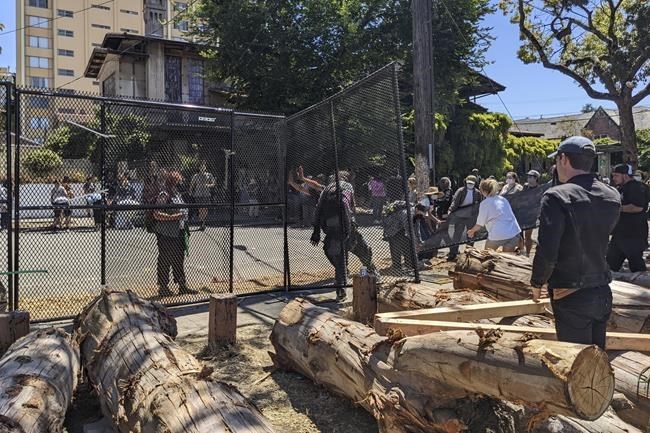BERKELEY, Calif. (AP) — A group of protesters broke through an 8-foot (2-meter) chain fence erected Wednesday around Berkeley’s historic People’s Park and faced off with police officers standing guard as a construction crew began work on a controversial student housing project. The work was halted for safety reasons.
The park was cleared overnight Tuesday and the fencing was put up the following day after an Alameda County Superior Court judge on Friday ruled that the University of California, Berkeley — the site's owner — could move forward with its housing plan despite local groups suing to stop it.
By the early afternoon, parts of the fence had been cut down by protesters, prompting small celebrations of vindication inside the park. Some of the protesters remained on site after the university said it decided to stop construction for the day “due to the destruction of construction materials, unlawful protest activity, and violence on the part of some protesters.” Some of the protesters climbed onto the bulldozers that remained near a basketball court in the park.
The protests harked back to the spring of 1969 when community organizers banded together to turn a site that the state and university seized under eminent domain and turned into a gathering space now known as People's Park. After the university erected a fence around the park, protesters sought to reclaim it, triggering bloody battles that resulted in police shooting and killing one man and wounding dozens of others. That May 15, 1969 uprising, known as “Bloody Thursday," triggered even more protests and then-California Gov. Ronald Reagan summoned the National Guard to occupy Berkeley, located about 12 miles (19 kilometers) east of San Francisco.
“It certainly does bring memories about the arrogance of the university and its unwillingness to consider the concerns of the community," said Dan Siegel, who was a student at the law school in 1969 who was arrested on Bloody Thursday after giving a speech at a campus rally that he ended by imploring the crowd to “go down there and take the park." The Associated Press reached Siegel, now a lawyer specializing in labor law, on Wednesday afternoon after the People's Park construction was stopped.
After the fences were put up again early Wednesday morning, about 100 police officers, some in riot gear, were at the park as the crew began cutting down trees to the derision of onlookers who were mostly kept outside barricades.
The police looked stoically at the onlookers amid period chants of “Power to the people!" before the majority of the protesters marched away in unison after the university stopped construction. UC Berkeley police said in a statement that protesters threw rocks, bottles, and glass at crews working at the park, which is considered aggravated assault. The department didn’t say if anyone was arrested.
In a statement, the university said it plans to assess the situation during the next few days to determine the best way to proceed with “urgently needed student housing project.” The university plans to build a complex that would accommodate about 1,100 students as well as 125 formerly homeless people. Part of the park will be set aside to commemorate its historic significance in the civil rights movement.
Two or three homeless people who were still at the park Wednesday were offered shelter, transportation, and storage for their belongings. The university didn't say whether they accepted the offer. Another 46 homeless people who used to live at the park previously accepted offers for shelter at a motel that is being paid for by the city of Berkeley, the university said.
___
Rodriguez reported from San Francisco.
Michael Liedtke And Olga R. Rodriguez, The Associated Press




